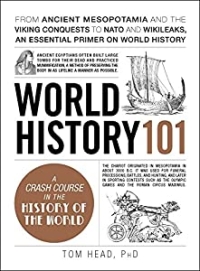Please click on the image to view details
Conversations with Jimmy Carter
In Conversations with Jimmy Carter, ten interviews, drawn from Carter’s five decades as a national public figure and author, capture the complexities and contradictions that have defined him—and that have helped to both reflect and shape the highest aspirations of the American experiment.
Crouzon Syndrome: A User’s Manual
Now, in this unorthodox new guide, he offers his reflections on what life with Crouzon Syndrome means—and the often strange and humorous lessons it has taught him.
Chance the Rapper: Making Music and Giving Back
Chance the Rapper: Musician and Activist
Kanye West: Conquering Music and Fashion
Kanye West: Rap Superstar and Fashion Designer
Ruby Bridges and the Desegregation of American Schools
The Scottsboro Boys
Air Commandos
Green Berets
World History 101
SKU: 9781507204542
"As anatomically modern humans learned how to harness the power of agriculture, they settled into cities, city-states, and, ultimately, nations. Within these social institutions they began to keep permanent written records, records that make up source material for a broader human story. We call that story history."
Civil Liberties: A Beginner’s Guide (Audiobook)
Does free speech have limits? Can torture be justified? Who is really in charge of your rights? Every day we are confronted with news of foreign governments who refuse to acknowledge liberties that we in the Western world take for granted. But civil liberties are nearly always under threat, no matter where you live.
Tom Head traverses the globe in order to provide a clear introduction to what civil liberties are and why they’re worth defending. From hate speech and modern slavery to wheelchair access, this handy guide offers a fascinating global history of civil liberties paired with inspiring advice on how to take an active role in their defense.
Ancient Mesopotamia
It’s Your World, So Change It
Crime and Punishment in America
Civil Liberties: A Beginner’s Guide
Six types of execution are practiced in the industrialized world, torture is openly sanctioned by America, and infringements of people’s civil liberties occur daily. Yet in 2005 only 61% of the British voting public chose to stand up for their rights.
Explaining what civil liberties are and why they’re worth defending, Tom Head shows how you can make a difference.
Conversations with Carl Sagan
Though a well-regarded physicist Carl Sagan (1934-1996) is best-known as a writer of popular nonfiction and science fiction and as the host of the PBS series Cosmos. Through his writings and spoken commentary, he worked to popularize interests in astronomy, the universe, and the possibility of extraterrestrial life. From the beginning of his public career, when he co-wrote Intelligent Life in the Universe to the very end as he worked on the 1997 film adaptation of his novel Contact, these subjects absorbed him.
This interest in space was rooted in his understanding of the smallness and vulnerability of humanity measured against the immense size and power of the universe. This profound philosophical humility, mixed with personal exuberance, comes through in Conversations with Carl Sagan. In interviews and profiles, Sagan discusses with verve a wide variety of topics--the environment, nuclear disarmament, religion, politics, extraterrestrial life, astronomy, physics, robotics. Whether he is discussing his science fiction or his well-researched nonfiction works, his voice embraces reason and skepticism.
This volume shows how Sagan, a lifelong skeptic, refined his views and expressed amazement that Earth, for all his belief in extraterrestrial life, encompasses everything about which he cared.
Absolute Beginner’s Guide to the Bible
The Bible is the core document of Western civilization, the pinnacle of world literature, and the backbone of three major world religions. To know the Bible is to know the world--and, many say, to know much more than the world.
Yet those interested in learning more about this important work discover a surprising paradox: It is both widely discussed and widely ignored. The Bible is a formidable book, and many people love it from a comfortable distance but don't want to get too close.
The Absolute Beginner's Guide to the Bible will help you close that distance and experience the Bible as it should be experienced, as a vibrant, living, and vital collection of texts that are just as inspiring and full of life today as they were thousands of years ago.
Get ready to feel like an expert right away. Inside The Absolute Beginner's Guide to the Bible, you'll learn how to:
• Find a translation or study Bible that's perfect for you.
• Interpret difficult Bible passages, taking into account their literary features and historical context.
• Appreciate the Bible's breadth. As a literary work, it includes poetry, philosophy, folk tales, history, theology, religious law, and even erotica.
• Understand the Hebrew Bible (Old Testament) as the deeply Jewish document that it is--and learn the approaches that rabbis have traditionally used to interpret scripture.
• Recognize the courageous missionary spirit behind the New Testament, a collection of documents, secret and illegal at the time, that would later shape the faith of billions.
What is the State of Human Rights?
Freedom of Religion
Books in the American Rights series look at rights guaranteed to U.S. citizens by the Bill of Rights. Although the Freedom of Religion clause makes its point in only 16 words, it has generated millions beyond that in discussion. This solid, readable volume walks readers through the part religion played in the formation of the colonies and looks at how faith informed the people's lives and the tensions among various religions. Head gives background on the First Amendment and then moves on to specific cases about religion in the U.S., including references to the Scopes trial and school prayer. Final chapters consider the politics of faith and the future of religious freedom. Although the complexity of the topic results in some dense writing, Head does a good job of presenting his information in an understandable manner, despite the complexity of the topic. Good-size print and frequent headings promote easy reading, and the appended material, which includes bibliographies and excerpts from documents by individuals such as Thomas Jefferson, is particularly helpful. The black-and-white photographs are dull in quality but interesting in content. Ilene Cooper
Copyright © American Library Association. All rights reserved
Is Torture Ever Justified?
The Future of the Internet
Religion and Education
1966
Possessions and Exorcisms
Mysterious Places
The Bill of Rights
Slaves
Confederate Generals
Union Generals
Women and Families
Mikhail Gorbachev
In contrast to biographies that offer a single perspective, this volume is a compilation of excerpts from books and articles that were published from 1988 to 1998. The authors include prominent journalists who were often eyewitness observers; academics; a former ambassador to the Soviet Union; and two well-known Russians, physicist Andrei Sakharov and writer Tatyana Tolstaya. After an introductory essay presenting the period under consideration, the excerpts are grouped chronologically. An appendix with writings by and interviews with Gorbachev follows. There is surprisingly little repetition in the 18 excerpts, and in the section on the Cold War, two opposing views are offered. While the selections are all extremely well written and clear, readers without a basic understanding of this period of history may find the numerous unfamiliar names and references to various events difficult to absorb. Therefore, the book might best serve social studies teachers seeking supplementary readings to assign to highly motivated students.
Elizabeth Talbot, University of Illinois, Champaign
Bears’ Guide to the Best Education Degrees by Distance Learning
Bears’ Guide to the Best Computer Degrees by Distance Learning
(Although I was not credited on the cover, I was given full co-author credit on the title page.)
Get Your IT Degree and Get Ahead
Conversas com Carl Sagan
Apesar de admirado como físico, Carl Sagan será lembrado como o popular escritor de não-ficção e ficção científica, assim como o apresentador de séries televisivas relacionadas com a Ciência. Apesar da escrita e dos comentários televisivos, trabalhou para popularizar o interesse na astronomia, no universo, e na possibilidade de vida extraterrestre. Desde o inicio da sua carreira pública, quando co-edita "Intelligent Life in the Universe" com o astrónomo soviético I.S. Shklovskii, até ao momento em que trabalha a adaptação para o cinema do seu livro "Contact", em 1997, estes foram sempre os temas que o absorveram.
O seu interesse no espaço não se ficou apenas pela ficção cientifica, mas também se interessou pela pequenez e vulnerabilidade da humanidade quando comparada com o tamanho imensurável do Universo e da sua força. Esta profunda humildade filosófica, misturada com a exuberância pessoal que frequentemente demonstrava nas entrevistas e nas suas séries de televisão, transparece em Conversas com Carl Sagan. Na sua colecção de entrevistas e conversas, Sagan discute com entusiasmo e enorme variedade de temas sobre os quais escreveu - o ambiente, o desarmamento nuclear, religião, politica, vida extraterrestre, astronomia, física, robótica.
Um activo promotor da educação científica e uma autoridade reconhecida na ciência e nos seus efeitos na humanidade, Sagan usou as entrevistas para elaborar e expor ideias que se encontravam diminuídas em importância. O seu ateísmo, impulsionado por um agonizante sentido de vulnerabilidade da raça humana, marcou muitos ferozes debates. Este é a primeira colecção de entrevistas de Carl Sagan, mas, felizmente, não será a ultima. Há certamente muitas possíveis entrevistas que podem ser escolhidas e compiladas para novos livros no futuro. Porque é uma colecção de entrevistas, é permitido a Carl Sagan falar por ele mesmo - e ninguém está mais qualificado a falar sobre o seu trabalho, os seus sonhos, os seus objectivos que o próprio Carl Sagan.






































